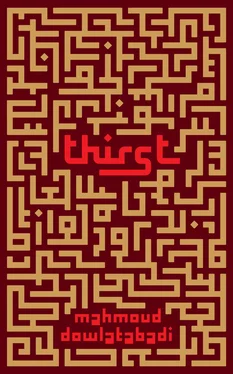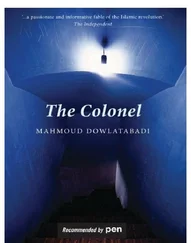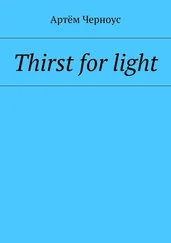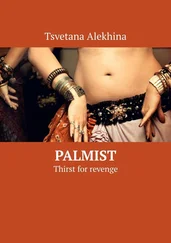‘But you … you do something else as well as all that — you think! I bet you’ve been to university …’
‘It would be easy for you to think too, you don’t need a university education. After all, all human beings think, but not all of them have been to university. Each person thinks to the extent of his knowledge.’
‘But I … when I think, I get to bad places; like how did I end up in this shitty situation? I keep turning that thought over in my mind.’
‘Then stop turning it over, break the vicious circle! It won’t solve the problem.’
‘How can I do that?’
‘It’s quite simple. Imagine you’re not alone. During the first half of the night at least three or four individuals like you and me were slain in front of our eyes while trying to fetch some water to save us from dying of thirst. But it’s still night, so how can we be sure? Maybe they aren’t dead yet? What if they’re lying down there, thirsty and wounded? Can you imagine how they’re suffering right now? But if you apply your mind to it, you can break out of that vicious circle of thought, because it won’t make any difference to the situation. Like it or not, here is where we are. And you can put any thoughts of deserting out of your mind too, because I have permission to shoot you in the back if you do. Even if I only shoot you below the knee you’ll be crippled for life. If I’m feeling merciful, I’ll fire into the ground behind you, and you’ll succeed in your escape attempt and run directly into the enemy lines. In which case you’ll end up being shot in the chest; you can be certain they won’t bother with any “below the knee” niceties. But even if we assume none of these things happen and by chance you manage to survive, that’s when the real problems begin for you: the desert, the sun, the thirst and the loneliness. Haven’t you ever heard of how people who are lost in a desert are brought to their knees by thirst and fatigue? Then it will be the turn of pitiless vultures who will start by digging your eyes out of their sockets!’
‘How do you know all this stuff? Did you read it in books?’
‘Look, just don’t think about it too much. You’ll start imagining things. We’ll be rescued tomorrow. We’ll look at the weather, the light, weigh up the situation, and then act. So we’ll be free. Free to rescue ourselves in any way we can. Keep your spirits up! I told you the story of that lioness, didn’t I? She’ll find us tomorrow, I promise. We’re not supposed to stay hunkered down on this hillside forever. Our next task is to find a way of breaking out of their pincer movement. Let me see what the opposite hill is up to. There’s firing going on behind them as well. What we’re engaged in now is a war of patience. Let’s see which side will yield to impatience first, us or them? So think about good things!’
* An idiom in Farsi.
ON THE OTHER SIDE of the Shatt al-Arab, two tropical flies keep skimming over the heads of the author’s wife and children. Their buzzing is constantly audible to the man, and he finds himself distracted by them in a most irritating manner; he becomes transfixed by the flies’ restless gyrations and falls to wondering whether they might be a male and female engaged in a courtship ritual. They land on the little girl’s purple cheek, grapple with each other and flit off again. The next place they alight is on his wife’s toes, which are peeking out from under the sheet. He decides to get up and kill the flies … but at the same time he permits himself a wry smile, as if to say, look, I can’t even manage to find an effective way of shooing away a couple of flies. Worse still, I’ve wasted precious moments watching them, and neglected the fact that my publisher is waiting for what I am writing, and what I’m obliged to write is a piece that recalls the Battle of Qadisiyyah. *The flies and I, the night and the candle, the Lamy fountain pen and Saad Waqqas; bombers and floodlights; a machine gun that in a blink of an eye can raze an enemy column to the ground the instant it comes into view; bulldozers, tanks and armoured cars; military aircraft in supersonic flight, buttons … red and green buttons … alarms; the blood-drenched sword of Saad. How many times should I mention the fact that he ordered a palace to be built in whose entrance the gates of the seven cities of Kasra could fit? Or note that the gates and the palace were burnt down by order of the caliph at the time because, as the caliph said to Saad, you are following the ways of Persian kings, so I command you to live in a house made of reeds like the common people or soldiers! My Lamy fountain pen writes fluently, but it cannot locate Saad. Instead it is trapped amid the fire and smoke on Hill Zero, and again writes: ‘Prisoners must not be killed!’ But at the same time it is clear that this universal humanitarian principle will not be deemed acceptable and that, instead, the author will be expected to write: ‘We do not kill captives — it is our enemies who show no mercy, even to prisoners; mercy they show not!’
They took him and showed him the prisoner-of-war camp. During this visit, as it turned out, the author — the owner of the fountain pen, which was a gift — witnessed a strange and incredible sight. The PoWs were badly shaven, with unkempt and bloody faces and eyes bloodshot from suffering. There were twenty-six alive, and one corpse: two convicts, with their hands tied back-to-back, were being paraded in front of a row of their fellow inmates because during the night they had smothered their cellmate to death. One of them had sat on the victim’s legs and gripped his ankles tight while the other held a folded blanket over his mouth and sat on top of it until he suffocated. There they stood, two young men shackled together, beards just sprouting on their smooth, unscarred faces. They had not been forced to dry-shave their light stubble. On reflection, ‘dry-shaving’ isn’t quite the right term; at nightfall, together with the pair of barber’s razors that were allotted to the prison wing, two empty buckets were provided. These were to be used as chamber pots, and the urine was then used to wet the soldiers’ faces for shaving. There was no escaping this unpleasant ordeal; a directive was issued to the effect that ‘any beard that has not been properly shaved or is only partly shaved will be dry-shaved by your own hands in the morning, after which you’ll be placed in solitary confinement!’
Afterwards the author was invited to the prison camp’s office for a cup of Yemenite coffee and treated to a lecture about the atrocities committed by the enemy, hot from the front. He was also promised a full account of what had happened in the prison the previous night, as well as other incidents that ‘are bound to be of interest to you … do you take sugar?’
‘Yes, just a little, thanks.’
‘When we’ve finished our coffee, I’ll take you to the other detention centres to give you a good idea of our magian enemy’s wickedness! We keep young men under the age of eighteen and older civilians in separate quarters to prevent such crimes from recurring. But even so …’
The author interrupted to say how he had read in history books that the Sassanids had once used to refer to their enemies as magi, or ‘sorcerers’; those people who were conquered in Iran, and by our swords, converted to Islam. I’m amazed to hear that you still call them magi!
‘You are naïve, my dear Katib. †The magi never converted. That’s the official version, certainly, so that’s the line we’re obliged to take. But if they are not magi, then what are they? There’s no insult too bad for the enemy, wouldn’t you agree? Let’s walk over there and I’ll show them to you, and describe what they have done, case by case. I’ll also present you with credible reports of atrocities like the mass murder of prisoners.’
Читать дальше












